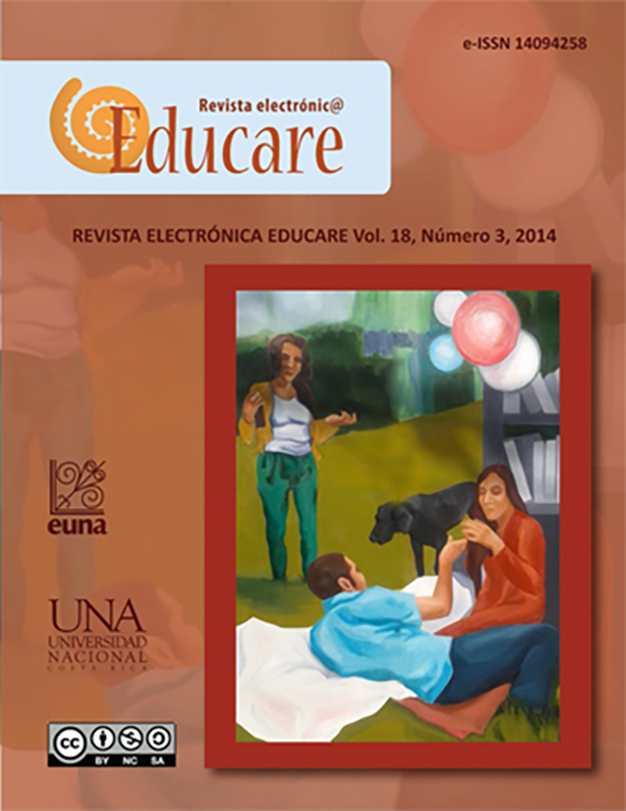La teoría del decrecimiento y el proceso de enseñanza-aprendizaje de lenguas
DOI:
https://doi.org/10.15359/ree.18-3.15Palabras clave:
Decrecimiento, desarrollo, economía, lingüística aplicada, enseñanza del inglés.Resumen
Recibido 14 de marzo de 2014 • Corregido 30 de julio de 2014 • Aceptado 22 de agosto de 2014
Esta disertación se propone mostrar cómo las consecutivas crisis que enfrentan las sociedades regidas por la economía de mercado involucran todas las esferas de generación y difusión del conocimiento y demandan de ellas serias redefiniciones, tanto en sus presupuestos epistemológicos como en sus acciones sustantivas. Más exactamente, se analizan los procesos de enseñanza-aprendizaje de lenguas a la luz de la teoría del decrecimiento, como un planteamiento alternativo a las tendencias de instrumentalizar las lenguas a favor de la legitimación de la vorágine de producción y consumo que amenaza el futuro global.
Referencias
Alpi, S. V., Sierra y Quiceno, J. M. (julio-diciembre, 2006). Salud y enfermedad desde el modelo mágico al bio-psico-social de la psicología de la salud. El Ágora USB, 6(2), 165-174. Recuperado de http://web.usbmed.edu.co/usbmed/elagora/docs/agora10/Agora%20Diez%20(Tema%201%20Salud%20y%20Enfermedad%20desde%20el%20modelo%20magico).pdf
Carmen, R. (2004). Desarrollo autónomo. Humanizar el paisaje: Una incursión en el pensamiento y la práctica radicales. Heredia, Costa Rica: EUNA.
Cook, G. (2003). Applied Linguistics [Lingüística aplicada]. Oxford: Oxford University Press. doi: http://dx.doi.org/10.1093/applin/24.2.249
Dale, R. y Robertson, S. (2004). Interview with Boaventura de Sousa Santos. [Entrevista con Boaventura De Sousa Santos]. Globalisation, Societies and Education, 2(2), 147-160. doi: http://dx.doi.org/10.1080/14767720410001733629
George, S. (2000). Informe Lugano. Barcelona: Icaria editorial.
Gómez, J. y Saxe, E. (marzo, 2010). El Banco Mundial y la educación superior comercializada. La universidad pública comercializada: Caso de la Universidad Nacional de Costa Rica (UNA). Ponencia presentada en el Congreso Internacional de Educación Superior. Universidad Nacional, Facultad de Filosofía y Letras. Recuperado de http://www.una.ac.cr/bibliografia_/components/com_booklibrary/ebooks/CB_CIESUP_07.pdf
Latouche, S. (2003). Decrecimiento y post desarrollo. El pensamiento creativo contra la crisis del absurdo. Madrid: El viejo Topo.
Narváez, A. (julio-diciembre, 2010). Educación, capitalismo y desarrollo. Cultura alfabética y globalización anglosajona. Signo y Pensamiento, 29(57), 248-267. Recuperado de http://www.redalyc.org/pdf/860/86020052016.pdf
Phillipson, R. (2003). Linguistic Imperialism [Imperialismo lingüístico]. Oxford: Oxford University Press.
Santos, B. (julio-septiembre, 2011). Epistemologías del Sur. Utopía y Praxis Latinoamericana, 16(54), 17-39. Recuperado de http://dialnet.unirioja.es/servlet/articulo?codigo=4231309
Saxe, E. E. (2006). Colapso mundial y guerra (2ª ed.). San José, Costa Rica: Amo al Sur Editorial. Recuperado de http://es.scribd.com/doc/145244805/33135782-Eduardo-E-Saxe-Fernandez-Colapso-Mundial-y-Guerra
Taibo, C. (2009). En defensa del decrecimiento. Sobre el capitalismo, crisis y barbarie. Madrid: Los libros de la Catarata.
Tettay, J. C. (3 de diciembre de 2012). El coltán. C. el Colombiano. Recuperado de http://www.elcolombiano.com/BancoConocimiento/E/el_coltan/el_coltan.asp
Tudor, I. (2000). The Dynamics of the Language Classroom [La dinámica de la clase de lenguas]. Cambridge: Cambridge University Press.
Descargas
Publicado
Cómo citar
Número
Sección
Licencia
1. En caso de que el artículo postulado sea aceptado para publicación, las personas autoras permite(n) la cesión GRATUITA, EXCLUSIVA Y POR PLAZO INDEFINIDO de su(s) derecho(s) patrimonial(es) a la Universidad Nacional (UNA, Costa Rica). Para más detalles consulte la Carta de originalidad y cesión de derechos.
2. Derechos de reutilización: La UNA les concede a los AUTORES(AS) el derecho de reutilizar para cualquier propósito, entre ellos el autoarchivo, y poder publicar en internet o cualquier sitio electrónico la versión final aprobada y publicada (post print) del artículo, siempre y cuando se realice sin fines de lucro, no genere obra derivada sin previa autorización y respete las fuentes de autoría.
3. La postulación y posible publicación del artículo en la Revista Electrónica Educare se regirá por sus políticas editoriales, la normativa institucional de la Universidad Nacional y la legislación de la República de Costa Rica. Adicionalmente, cualquier eventual diferencia de criterio o disputa futura se dirimirá de acuerdo con los mecanismos de Resolución Alterna de Conflictos y la Jurisdicción Costarricense.
4. En todos los casos se entiende que las opiniones emitidas son de las personas autoras y no necesariamente reflejan la posición u opinión de la Revista Educare, el CIDE o la Universidad Nacional, Costa Rica. Se entiende también que, en ejercicio de libre cátedra, las personas autoras han realizado un proceso científico-académico de investigación, reflexión y argumentación rigurosas y dentro del ámbito temático de interés de la Revista.
5. Los artículos publicados por la Revista Electrónica Educare utilizan Licencia Creative Commons:
















 Los artículos de la Revista Electrónica Educare se comparten con Licencia Creative Commons:
Los artículos de la Revista Electrónica Educare se comparten con Licencia Creative Commons: 



